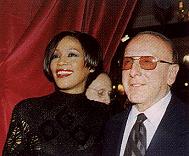
Up in the £2,496-per-night Oliver Messel suite (six rooms, lashings of gilt) of London's Dorchester hotel, Clive Davis shakes his head at the folly of it all. In 40 years in music, there's almost nothing he hasn't seen, but he is bemused by the spectacle of the talent revolting against the paymasters.
"Michael Jackson," he sighs. "Do I think he could still have hits? Yes. Do I think he's still talented? Yes. Do I think his current actions are sensible? No. I'd certainly take issue with Sony being prejudiced against black artists. I don't see any evidence of that."
Though none of the artists on the roster at his own J records has shown signs of unrest, Davis knows better than most record executives the perils of the prima donna. He discovered, signed or mentored Bob Dylan, Janis Joplin, Bruce Springsteen, Aretha Franklin, Whitney Houston and Patti Smith. More recently, he transformed Carlos Santana from has been to shock comeback story ("Twenty-six million copies," he says casually, "and I signed him for pretty much the recording costs of the album") and helped turn Alicia Keys from unknown into the winner of five Grammys.
So when he says, "I don't think that because there are some dissident artists, there's been a shift in power from labels to artists", other label presidents might sleep a little more easily. "I've never been involved with one and no one has ever sued me." That said, Davis has a unique perspective on the situation. The typical label boss these days is a bean-counter with an MBA, but Brooklyn-born Davis is the product of a time when the guys running the companies were as colourful as their acts.
He has been president of both CBS (from which he resigned in 1973, after allegedly charging $70,000 for his son's bar mitzvah and home renovations to company expenses) and Arista, acquiring not just a constellation of rock-star friends but two chapters in a bestselling 1990 book, Hit Men: Power Brokers and Fast Money Inside the Music Business, by Fredric Dannen. Its portrayal of Davis was not entirely flattering, claiming that he had taken credit for discovering acts who were actually brought to his attention by A&R scouts. But it had no discernible effect on his career, which is still sustained, say his peers, by an extraordinary ability to spot hits. Two years ago, he reaffirmed his status as a major player by launching J Records at the age of 67.
The story behind J gives new meaning to the word "driven". When company retirement policy forced Davis to hand over the chairmanship of Arista at 65, he refused to accept that it was time to take up his pipe and slippers. "I said, 'I've still got the ability to spot and nurture talent,' and I asked BMG [Arista's parent company] if they would do something historic and unprecedented and fund an 'instant major'. They funded it for $150m - half from me and half from BMG - and they allowed me to take my senior staff coupled with 10 artists, five either platinum or above and five of my choice that I had been developing. To their credit, they did that. As long as one's health is good, it's exciting to nurture talent. I love what I do. I know you have to earn it all, but with the contemporary nature of my ears I feel the same age as a young person. I'm putting in 12- to 15-hour days."
He unearths a copy of American trade mag Billboard and opens it to a four-page J ad. "Look at this. Alicia - 5m sales. Busta Rhymes, over a million. O-Town [think a weedier Backstreet Boys], 1.6." On the next page is a shot of Rod Stewart, a new Davis signing. The text announces that on his first J album, the priapic old card "inimitably reinterprets the classics".
With a CV like his (his official J biography lists three pages of achievements and gongs, including New York's Mayor Dinkins declaring June 6 1992 Clive Davis Day in recognition of his charity work), there's no point in modesty. Asked whether he will ring Michael Jackson if he leaves Sony, he peers incredulously over his tinted glasses. "I don't call them, they call me."
Well, Mariah Carey did. After she was paid off by EMI following poor sales of her last album, she came to see Davis. He is gentlemanly about the foundering diva, whose slick pop-soul is right up his street (he signed Houston, Toni Braxton and Keys). "I think Mariah is very talented," he says, "and can still have hits, but she wanted an unqualified key-man clause [allowing her to leave the label if specified members of Davis's team leave] in her contract and I don't think that works today."
He is briefly distracted by an MTV video. A generic R&B Amazon is flailing in the arms of two male dancers; Davis studies it with professional interest, possibly the only 69-year-old on the planet to watch MTV and cluck not over the singer's booty-skimming skirt but the lacklustre vocal mix.
He is also, arguably, the only one who can tell Brandy from Monica, the soul-lite princesses who had a big collaborative hit with The Boy Is Mine. He has just signed Monica, and the night before our interview, he hosted a UK press launch for her and a 15-year-old named Mario, who tore the place up with a cover of Stevie Wonder's Knocks Me Off My Feet. Both artists are in keeping with J's broadly R&B-ish direction, the area where Davis has had much of his success.
Being white and Jewish has never proved an obstacle in being accepted by black acts, he says: "Why should it? It goes back to Lieber and Stoller." One of his proteges was Puff Daddy, whom he discusses like a much-loved but wayward nephew. "Once you call a label Bad Boy, you can't sign Bob Dylan or Patti Smith. They won't want to be on it. I told Puffy, but he wouldn't listen." His laconic New York inflections rise a tone or two at the Puffster's rashness.
What is his take on the growing practice of sexualising teenage artists? "I'm wary of youngsters who don't have the maturity in their writing and performance to understand - of every 50 I see, I sign one. There are some natural wonders, and Mario is one. He blew Stevie Wonder away at my Grammy party." There's no denying that at last night's launch, Mario bonded with the girls like an underweight Barry White, but it's disconcerting to find that sort of knowingness in someone too young to shave.
At the other end of the age scale is Rod Stewart, who was dropped by WEA last year. Spurred on by a demo tape Stewart played him, Davis has taken him on for what he terms a "special album". He's excited about it, and crosses the room to slot a CD into the player. Stewart's unmistakable rasp fills the air, gargling through the jazz standard They Can't Take That Away from Me, accompanied by a swooning cocktail-lounge orchestra. "He's singing the great American songbook," Davis explains. "I think this is gonna be tremendous."
Makes you wonder. Robbie Williams sold millions of copies of Swing When You're Winning last year because people enjoyed the combination of young smart-ass and old tunes . But can Stewart pull it off? Well, he's big in America and Williams isn't. Why hasn't any young British act except Dido - another Davis signing - succeeded in the US?
He reckons it's a matter of "being at the creative pulse and at the moment that's hip-hop and rock, which are hard for the British to emulate. There's an element to UK dance-pop that's not fashionable in the US, though I'd have certainly signed Craig David. You sign acts when you're excited, and I think we're not going through a revolutionary time in music where boundaries are being pushed forward," he goes on meditatively. "Rock can use a new Bob Dylan or Springsteen." Davis is out there looking, and he'll know when he's found them. "I get a feeling when I hear a hit. I can always tell."
( a ver si alguien puede tradcir algo por favor)


